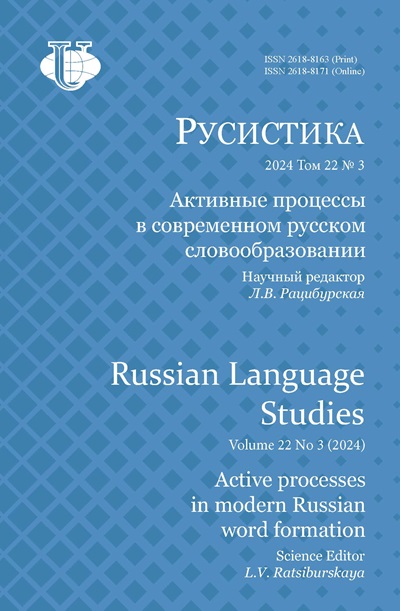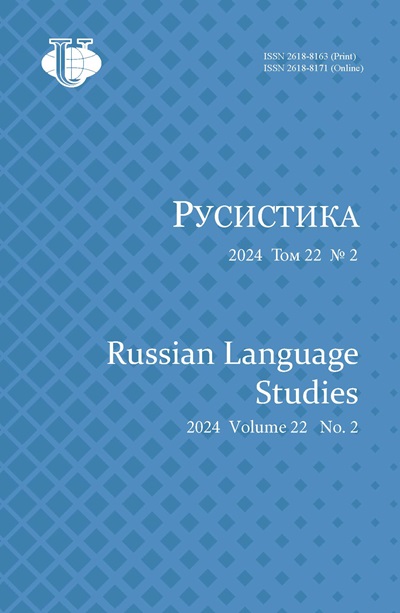The phenomenon of Russian quotation: to the problem of methodological research
- Authors: Yadrovskaya E.R.1, Dunev A.I.1
-
Affiliations:
- Herzen State Pedagogical University of Russia
- Issue: Vol 22, No 2 (2024)
- Pages: 190-207
- Section: Cultural Linguistics: Theoretical and Applied Aspects
- URL: https://journals.rudn.ru/russian-language-studies/article/view/40556
- DOI: https://doi.org/10.22363/2618-8163-2024-22-2-190-207
- EDN: https://elibrary.ru/RADTAM
Cite item
Full Text
Abstract
The subject of the study is a Russian quotation from a literary text as part of the intertextual thesaurus of modern youth. The relevance of the study is due to the lack of research on the methodological potential of Russian quotation - a significant part of the national cultural code - in modern educational discourse. The aim of the study is to substantiate the methodological potential of the quotation and to determine the tasks for developing an intertextual thesaurus for Russian schoolchildren studying the Russian language and literature. The material for the study included: 1) interpretations and definitions from explanatory and terminological dictionaries and reference books; 2) monographs, dissertations and articles, Federal educational program, and lesson notes; 3) the results of a survey among students of the Faculty of Philology of Herzen State Pedagogical University of Russia, high school students, students of the State Institution of Extended Education Center “Intellect” for gifted schoolchildren from Leningrad region (414 respondents in total). Research methods were: 1) content analysis; 2) comprehensive and comparative analysis of scientific works; 3) pilot survey. As a result of a content analysis of the definition of “quotation”, the key characteristics of a quotation were highlighted and a definition of this concept in the educational and methodological aspect was given. Based on a comprehensive and comparative analysis of scientific articles and dissertations written over the past 20 years, the aspects of the study of quotations in various fields of humanities were identified. The analysis of the Federal programs on Russian language and literature for basic and general education and teachers’ notes showed that the educational, including nourishing potential of quotations, is not sufficiently used in the process of linguistic and literary development of schoolchildren. The pilot survey revealed that students have an insufficient level of knowledge and understanding of quotations from the school curriculum. The key idea of the study is the need to create a methodological system of working with quotations for developing a linguistic personality aware of the national verbal cultural code. The study defines the tasks relevant for an integral system of work and outlines further prospects for studying the problem.
About the authors
Elena R. Yadrovskaya
Herzen State Pedagogical University of Russia
Author for correspondence.
Email: beisher@mail.ru
ORCID iD: 0000-0002-2746-9154
SPIN-code: 7752-5775
Doctor of Pedagogy, Professor of the Department of Educational Technologies in Philology
48 Moika River embankment, St. Petersburg, 191186, Russian FederationAlexey I. Dunev
Herzen State Pedagogical University of Russia
Email: al_dunev@mail.ru
ORCID iD: 0000-0002-0337-4986
SPIN-code: 2884-8095
Candidate of Philology, Associate Professor of the Russian language department
48 Moika River embankment, St. Petersburg, 191186, Russian FederationReferences
- Xiong, B., & Robles, J.S. (2023). Functions of quotation in online political comments. Discourse, Context & Media, (55), 1–8. https://doi.org/10.1016/j.dcm.2023.100717
- Chernyak, V.D., & Chernyak, M.A. (2021). Let’s join hands, friends: Bulat Okudzhava in the intertextual thesaurus. Tomsk State University Journal, (6), 7–16. (In Russ.). https:// doi.org/10.23951/1609-624x-2021-6-7-16
- Chernyak, V.D., & Chernyak, M.A. (2022).‘When it was — figure out, where it was — guess...’: Nekrasov in the perception of the XXI Century reader. Tomsk State University Journal, (3), 88–96. (In Russ.). https://doi.org/10.23951/1609-624x-2022-3-88-96
- Dunev, A.I., & Yadrovskaya, E.R. (2023). Precedent phenomena, quotes and interpretive activity of a schoolchild. Pretsedentika v tezauruse yazykovoi lichnosti: Kollektivnaya monografiya (pр. 111–122). Saint Petersburg: Viktoriya plyus Publ. (In Russ.).
- Fetzer, A. (2020). ‘And I quote’: Forms and functions of quotations in Prime Minister’s questions. Journal of Pragmatics, (157), 89–100. https://doi.org/10.1016/j.pragma.2019.05.004
- Fokina, O.V. (2014). Using a dictionary of communicatively significant quotes when teaching Russian as a foreign language. Journal of historical, philological and cultural studies, (3(45)), 317–319. (In Russ.).
- Gudkov, D.B. (1997). Some features of the functioning of precedent statements. Moscow State University Journal. Series 9. Philology, (4), 106–118. (In Russ.).
- Karaulov, Yu.N. (2004). Russian language and linguistic personality. Moscow. 216 р. (In Russ.).
- Kirner-Ludwig, M. (2020). Creation, dissemination and uptake of fake-quotes in lay political discourse on Facebook and Twitter. Journal of Pragmatics, (157), 101–118. https:// doi.org/10.1016/j.pragma.2019.07.009
- Kostomarov, V.G., & Burvikova, N.D. (1994). How texts become precedent. Russkii yazyk za rubezhom (pр. 73–76). Saint Petersburg. (In Russ.).
- Kupina, N.A. (2021). Precedent fund of Russian culture and the linguistic personality of a schoolchild. Philological class, (4), 230–240. (In Russ.). https://doi.org/10.51762/1fk-2021-26-04-20
- Levushkina, O.N. (2021). Sayings of classics as impulse texts in Russian language lessons. Sciences of Europe, (81), 37–43. (In Russ.). https://doi.org/10.30515/0131-6141-2021-82-5-7-14
- Mamleeva, A.F. (2021). Reading and analysis of quotes as the basis for the development of oral reasoned speech skills in a foreign language. Teaching Methodology in Higher Education, (37), 58–67. (In Russ.).
- Moiseenko, L.V., & Quero Gervilla, E. (2021). The precedent context of Russian mass media discourse. Russian language studies, (4), 453–465. (In Russ.). https://doi.org/10.22363/2618-8163-2021-19-4-453-465
- Musolff, A. (2020). How (not?) to quote a proverb: The role of figurative quotations and allusions in political discourse. Journal of Pragmatics, (155), 135–144. https://doi.org/ 10.1016/j.pragma.2019.10.011
- Neznaeva, O.S. (2019). Precedent phenomena in student communication: mechanisms of emergence and actualization in various speech situations. Saratov. (In Russ.).
- Pichugina, V.K., Bezrogov, V.G., & Volkova, Ya.A. (2019). Quotation as basis for education: Experience of “anthology” by Ioannes Stobaeus. Obrazovatel’noe prostranstvo v informatsionnuyu epokhu. Sbornik nauchnykh trudov. Materialy mezhdunarodnoi nauchno-prakticheskoi konferentsii (pр. 67–279). (In Russ.). https://doi.org/10.15405/epsbs.2019. 09.02.72
- Polubichenko, L.V., & Fursova, A. A. (2020). Educational dictionary of quotations. Prerequisites and first results. Lomonosov Philology Journal, (1), 47–56.(In Russ.)
- Prokhorov, Yu.E. (2004). Reality. Text. Discourse. Moscow: Nauka Publ. (In Russ.).
- Sidorenko, K. P. (1999). Intertextual connections of Pushkin’s word. Saint Petersburg: Izd-vo RGPU im. A.I. Gertsena Publ. (In Russ.).
- Solomina, N.V. (2008). Intertextual thesaurus of modern linguistic personality (based on written texts of the media, KVN and intellectual games). (Candidate dissertation, Ekaterinburg). (In Russ.).
- Stepashkina, O., & Zeleneva V. (2022). Learning to speak a foreign language: Schoolchildren’s interethnic tolerance development based on quotations. Philology and culture, (4), 209–215. (In Russ.). https://doi.org/10.26907/2782-4756-2022-70-4-209-215
- Syrova, O.V. (2017). Using logoepistemes in Russian language lessons. Vostochnoslavyanskaya filologiya. Yazykoznanie, (4(30)), 223–229. (In Russ.).
- Vershinina, N.V. (2002). Citing literary text in the explanatory speech of a literature teacher. (Candidate dissertation, Moscow). (In Russ.).
- Yasko, A.V., & Efimova, T.A. (2018). Precedent texts in Russian language lessons. Nauka I obrazovanie: Problem I perspektivy (pр. 299–302). Saint Petersburg: Amfora Publ. (In Russ.).
- Zanadvorova, A.V. (2019). Quotation in family communication. Russkaya rech’, (5), 34–46. (In Russ.). https://doi.org/10.31857/s013161170005690-8
- Zappavigna, М. (2020). Social media quotation practices and ambient affiliation: Weaponising ironic quotation for humorous ridicule in political discourse. Journal of Pragmatics, (191) 98–112. https://doi.org/10.1016/j.pragma.2021.12.003















